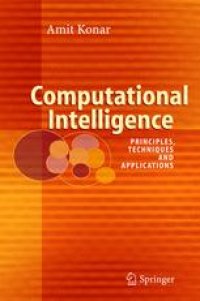
Ebook: Computational Intelligence: Principles, Techniques and Applications
Author: Prof. Dr. Amit Konar (auth.)
- Tags: Appl.Mathematics/Computational Methods of Engineering, Artificial Intelligence (incl. Robotics), Complexity, Vibration Dynamical Systems Control, Control Robotics Mechatronics, Pattern Recognition
- Year: 2005
- Publisher: Springer-Verlag Berlin Heidelberg
- Edition: 1
- Language: English
- pdf
The book Computational Intelligence: Principles, Techniques and Applications presents both theories and applications of Computational Intelligence in a clear, precise and highly comprehensive style. The textbook addresses the fundamental aspects of Fuzzy Sets and Logic, Neural Networks, Evolutionary Computing and Belief Networks. The application areas include Fuzzy Databases, Fuzzy Control, Image Understanding, Expert Systems, Object Recognition, Criminal Investigation, Telecommunication Networks and Intelligent Robots. The book contains many numerical examples and homework problems with sufficient hints so that the students can solve them on their own. Emerging areas of Computational Intelligence such as artificial life, particle swarm optimization, artificial immune systems, fuzzy chaos theory, rough sets and granular computing have also been addressed with examples in this book. The book ends with a discussion on a number of open- ended research problems in Computational Intelligence. Graduate students interested to pursue their research in this subject will greatly be benefited with these problems.
The book Computational Intelligence: Principles, Techniques and Applications presents both theories and applications of Computational Intelligence in a clear, precise and highly comprehensive style. The textbook addresses the fundamental aspects of Fuzzy Sets and Logic, Neural Networks, Evolutionary Computing and Belief Networks. The application areas include Fuzzy Databases, Fuzzy Control, Image Understanding, Expert Systems, Object Recognition, Criminal Investigation, Telecommunication Networks and Intelligent Robots. The book contains many numerical examples and homework problems with sufficient hints so that the students can solve them on their own. Emerging areas of Computational Intelligence such as artificial life, particle swarm optimization, artificial immune systems, fuzzy chaos theory, rough sets and granular computing have also been addressed with examples in this book. The book ends with a discussion on a number of open- ended research problems in Computational Intelligence. Graduate students interested to pursue their research in this subject will greatly be benefited with these problems.
The book Computational Intelligence: Principles, Techniques and Applications presents both theories and applications of Computational Intelligence in a clear, precise and highly comprehensive style. The textbook addresses the fundamental aspects of Fuzzy Sets and Logic, Neural Networks, Evolutionary Computing and Belief Networks. The application areas include Fuzzy Databases, Fuzzy Control, Image Understanding, Expert Systems, Object Recognition, Criminal Investigation, Telecommunication Networks and Intelligent Robots. The book contains many numerical examples and homework problems with sufficient hints so that the students can solve them on their own. Emerging areas of Computational Intelligence such as artificial life, particle swarm optimization, artificial immune systems, fuzzy chaos theory, rough sets and granular computing have also been addressed with examples in this book. The book ends with a discussion on a number of open- ended research problems in Computational Intelligence. Graduate students interested to pursue their research in this subject will greatly be benefited with these problems.
Content:
Front Matter....Pages I-XXIII
An Introduction to Computational Intelligence....Pages 1-35
Fuzzy Sets and Relations....Pages 37-66
Fuzzy Logic and Approximate Reasoning....Pages 67-95
Fuzzy Logic in Process Control....Pages 97-123
Fuzzy Pattern Recognition....Pages 125-138
Fuzzy Databases and Possibilistic Reasoning....Pages 139-165
Introduction to Machine Learning Using Neural Nets....Pages 167-195
Supervised Neural Learning Algorithms....Pages 197-235
Unsupervised Neural Learning Algorithms....Pages 237-265
Competitive Learning Using Neural Nets....Pages 267-293
Neuro-dynamic Programming by Reinforcement Learning....Pages 295-321
Evolutionary Computing Algorithms....Pages 323-351
Belief Calculus and Probabilistic Reasoning....Pages 353-391
Reasoning in Expert Systems Using Fuzzy Petri Nets....Pages 393-421
Fuzzy Models for Face Matching and Mood Detection....Pages 423-452
Behavioral Synergism of Soft Computing Tools....Pages 453-475
Object Recognition from Gray Images Using Fuzzy ADALINE Neurons....Pages 477-496
Distributed Machine Learning Using Fuzzy Cognitive Maps....Pages 497-520
Machine Learning Using Fuzzy Petri Nets....Pages 521-546
Computational Intelligence in Tele-Communication Networks....Pages 547-570
Computational Intelligence in Mobile Robotics....Pages 571-609
Emerging Areas of Computational Intelligence....Pages 611-641
Research Problems for Graduate Thesis and Pre-Ph D Preparatory Courses....Pages 643-668
Back Matter....Pages 669-708
The book Computational Intelligence: Principles, Techniques and Applications presents both theories and applications of Computational Intelligence in a clear, precise and highly comprehensive style. The textbook addresses the fundamental aspects of Fuzzy Sets and Logic, Neural Networks, Evolutionary Computing and Belief Networks. The application areas include Fuzzy Databases, Fuzzy Control, Image Understanding, Expert Systems, Object Recognition, Criminal Investigation, Telecommunication Networks and Intelligent Robots. The book contains many numerical examples and homework problems with sufficient hints so that the students can solve them on their own. Emerging areas of Computational Intelligence such as artificial life, particle swarm optimization, artificial immune systems, fuzzy chaos theory, rough sets and granular computing have also been addressed with examples in this book. The book ends with a discussion on a number of open- ended research problems in Computational Intelligence. Graduate students interested to pursue their research in this subject will greatly be benefited with these problems.
Content:
Front Matter....Pages I-XXIII
An Introduction to Computational Intelligence....Pages 1-35
Fuzzy Sets and Relations....Pages 37-66
Fuzzy Logic and Approximate Reasoning....Pages 67-95
Fuzzy Logic in Process Control....Pages 97-123
Fuzzy Pattern Recognition....Pages 125-138
Fuzzy Databases and Possibilistic Reasoning....Pages 139-165
Introduction to Machine Learning Using Neural Nets....Pages 167-195
Supervised Neural Learning Algorithms....Pages 197-235
Unsupervised Neural Learning Algorithms....Pages 237-265
Competitive Learning Using Neural Nets....Pages 267-293
Neuro-dynamic Programming by Reinforcement Learning....Pages 295-321
Evolutionary Computing Algorithms....Pages 323-351
Belief Calculus and Probabilistic Reasoning....Pages 353-391
Reasoning in Expert Systems Using Fuzzy Petri Nets....Pages 393-421
Fuzzy Models for Face Matching and Mood Detection....Pages 423-452
Behavioral Synergism of Soft Computing Tools....Pages 453-475
Object Recognition from Gray Images Using Fuzzy ADALINE Neurons....Pages 477-496
Distributed Machine Learning Using Fuzzy Cognitive Maps....Pages 497-520
Machine Learning Using Fuzzy Petri Nets....Pages 521-546
Computational Intelligence in Tele-Communication Networks....Pages 547-570
Computational Intelligence in Mobile Robotics....Pages 571-609
Emerging Areas of Computational Intelligence....Pages 611-641
Research Problems for Graduate Thesis and Pre-Ph D Preparatory Courses....Pages 643-668
Back Matter....Pages 669-708
....